The 10 best construction ERP systems
The construction industry uses specialized equipment, and its ERP software is no exception. When selecting software for your construction firm, opting for a construction industry ERP that fits your specific needs can often save you time in getting your processes up and running.
Your first step to finding the best construction enterprise software for your business is narrowing down your feature requirements. In this guide, we’ve outlined some of the top construction ERP systems, along with key features you should look for when making your decision.
What is construction ERP software?
Construction ERP software is a specialized enterprise resource planning system built for the unique needs of construction companies. These systems should include management of general contractors, subcontractors, financial management, construction accounting, payroll, and service operations in one central database.
Features to look for in a construction industry ERP
When selecting an ERP for your construction company, consider these features:
- CAD interface
- Accounting
- Service fleet asset management
- Financial management
- Payroll
- Management of contractors
- Sub-contractor management
- Logistics and transport
- Scheduling
- Complex workforce management
- Inventory
- Workflow processes
How to select your best-fit construction ERP software
The construction industry is diverse, so the best ERP will depend on your business type. A general contractor needs an ERP that can handle a large workforce, while a specialty contractor might prioritize features like subcontractor management and job costing. A well-chosen ERP can help you:
- Track costs and ensure timely payments.
- Manage subcontractor schedules and workforce efficiently.
- Provide real-time project insights to avoid delays.
Plumbers, electricians, crane operators, and those specialty trades depend on everyone involved to keep the project moving as planned while controlling their costs, receiving payments from the general, and keeping the paychecks flowing to their working staff. No single ERP handles all these diverse needs perfectly, but let's look at a few examples, and you can make up your own mind.
Here are 10 of the best construction ERP systems
CMiC
CMiC’s ERP, the leading next-generation construction software, is a fully integrated solution that is designed to deliver industry-specific functionality and workflows. The solution transforms how construction firms optimize productivity, minimize risk, and drive growth by planning and managing all financials, projects, resources, and content assets. CMiC's biggest differentiator is that their ERP is built on a Single Database PlatformTM, which is proven to provide key business benefits:
- Centralized Data Management: Streamlined operations, real-time analytics, and data accuracy.
- Data Migration: Reduced downtime, enhanced data integrity, and cost savings.
- Enhanced Data Platform Capabilities: Scalability, customization, robust reporting and analytics, and advanced integration features.
- Improved Efficiency and Productivity: Streamlined workflows, effective resource allocation, reduced redundancies, and faster decision-making.
SAP S/4HANA
SAP S/4HANA is a leading ERP solution designed for large-scale enterprises, including construction companies. It provides real-time data processing and advanced analytics while seamlessly integrating with other SAP products and third-party apps, letting businesses manage everything from procurement and supply chain logistics to payroll and subcontractor management. Its cloud capabilities and AI-powered automation are ideal for construction companies looking to optimize operations and improve decision-making across the entire project lifecycle.
Foundation Software
Foundation Software focuses on construction accounting and is widely used by mid-sized construction firms. This ERP helps businesses manage job costing, payroll, scheduling, and project management. It’s particularly beneficial for companies transitioning from smaller accounting solutions like QuickBooks, offering scalability for businesses with 15 to 250 employees.
Acumatica Cloud ERP
Acumatica offers a modern, cloud-based ERP that caters to construction businesses looking for real-time project reports, financial management, and communication tools. Acumatica’s Construction Edition is highly customizable and is popular with general contractors and land developers. Its mobile-friendly design allows for easy field-to-office communication, keeping everyone on the same page.
Jonas ERP
Jonas ERP provides fully integrated construction accounting software used by over 1,000 clients in industries like HVAC, plumbing, and electrical. With features like service order management, accounting, and field service capabilities, Jonas Premier and Jonas Enterprise help contractors and developers streamline workflows. Jonas is ideal for companies with revenue between $5 million and $100 million.
Sage Intacct
Sage Intacct is a cloud-based financial management solution that is ideal for construction companies in need of advanced accounting, project costing, and financial reporting tools. Unlike traditional ERPs, Intacct is built with financial management at its core, providing real-time dashboards, AI-driven insights, and automated workflows. Highly scalable, it integrates with construction project management tools, enabling efficient cash flow, budget, and billing management. Sage Intacct's user-friendly interface and focus on financial accuracy make it ideal for businesses needing detailed financial control.
Microsoft Dynamics 365 Business Central
Replacing Microsoft Dynamics SL is the more modern, cloud-based solution, Dynamics 365 Business Central. Business Central provides tools tailored for the construction industry, helping manage project planning, budgets, procurement, and on-site work. It also simplifies project estimates, job costing, and financial management for project-based businesses.
IFS Cloud
IFS Cloud is an advanced ERP system that focuses on project management, financial management, and asset management for large construction businesses. With its ability to manage complex field service operations, IFS is a powerful choice for companies involved in infrastructure projects, asset-heavy operations, and equipment management. Its mobile-friendly features ensure smooth project execution across various job sites.
Viewpoint
Viewpoint, a part of Trimble, provides construction software designed to integrate construction accounting, project management, and field productivity. Built for construction businesses like general contractors and civil engineers. It offers specialized modules for various trades, including electrical and mechanical contractors, making it an ideal solution for medium to large businesses.
Penta
Penta ERP has been a top choice for heavy construction companies and subcontractors for over 35 years. It includes construction accounting, project management, payroll, and equipment tracking. Penta’s strengths lie in managing complex subcontractor relationships, large-scale projects, and asset-heavy operations.
Honorable mention: Maestro ERP, an integrated management platform for construction contractors
Maestro is a Canadian ERP designed for construction sectors such as general contractors, trade contractors, and home builders.
The system includes accounting, project management, and payroll, with customizable modules that allow companies to tailor the software to their unique requirements. Its flexibility suits businesses looking to grow and adapt their ERP as their needs evolve.
Use our free construction ERP comparison tool to find the best software for your business needs
Which ERP is best for a construction company?
The best ERP for a construction company depends on the specific needs of the business. Key factors to consider include scalability, industry-specific features, mobile access, and integration capabilities with other systems like CAD and payroll. For general contractors, Viewpoint and Jonas ERP are strong choices. For businesses seeking cloud flexibility, Acumatica, Microsoft Dynamics 365, Sage and IFS offer robust solutions that can scale as your company grows.
Free white paper
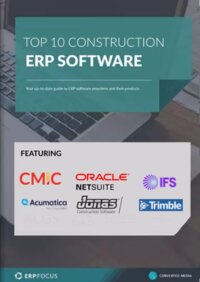
Top 10 Construction ERP Software Comparison
Get your free comparison of the top 10 construction ERPs
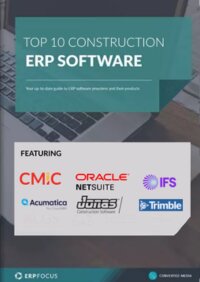
Featured white papers
-
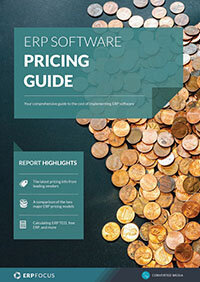
ERP Software Pricing Guide
Get the latest pricing information on over 80 popular ERP systems, and learn how to budget for your ERP project in our free guide
Download -
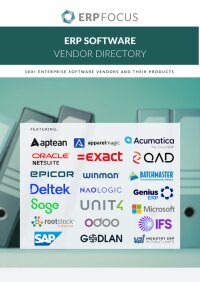
ERP Software Vendor Directory
Put the most comprehensive ERP vendor directory on your desk today
Download -
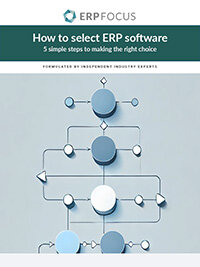
How to Select ERP
Learn to select your ERP in 5 easy steps by following our expert's advice
Download
Related articles
-

Budgeting for an ERP consultant
How much can you expect to pay out for an ERP consultant?
-

How the right ERP can help you launch a successful omnichannel business
Petersen Zhu, CEO of DigitBridge and Vibes Base, shares how to create a scalable omnichannel stra...
-

Top free ERP and open source systems (plus hidden costs)
When it comes to free ERP software, it pays to remind yourself of the old adage ‘there ain’t no s...

